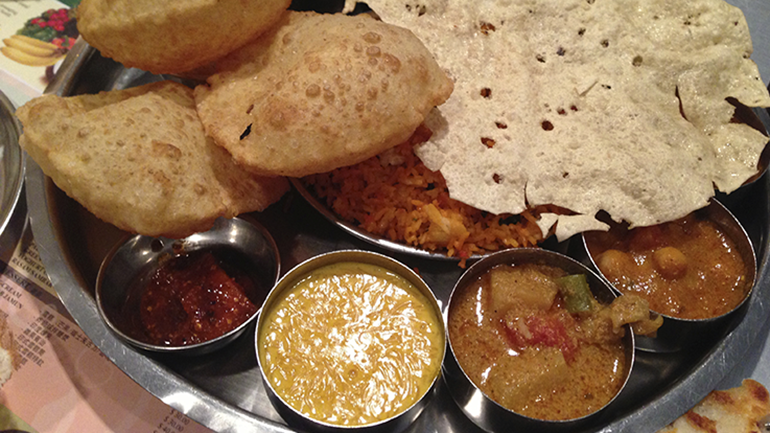
Fraser Health has been working with local gurdwaras and temples to make changes to their kitchen and food programs.
SURREY– Dhal, rice, roti, vegetable curry, lassis and kheer – they are delicious and they can be deadly. That’s why, for the last year, Fraser Health has been working with local gurdwaras and temples to make changes to their kitchen and food programs, with impressive results, reducing sugar consumption by 25 per cent, and cutting fat by 70 per cent.
The Apnee Sehat program helps gurdwaras and temples design new ways to help South Asian residents eat healthier. The program has partnerships with seven temples in Surrey, Delta, New Westminster and Abbotsford, and logged more than 5,000 participant interactions.
“This is an innovative, patient-centred design lab for community-based wellness,” said Minister of Health Terry Lake. “We know that simply making healthier food choices can have a dramatic impact in a person’s health. The Apnee Sehat program is an impressive example of what can be done when you find ways to address healthy eating within a particular community.”
A team of staff and volunteers visits different locations every week, hosts hands-on activities that engage and educate – everything from taste tests of their easy-to-make Sehat lassi, to digital media campaigns on temple monitors and websites, to interactive food displays – with a goal of helping people see what’s really in the food they’re eating.
“Sehat is a living example of translating data to action. Research shows that chronic diseases are higher among South Asians compared to Fraser Health overall,” said Dr. Victoria Lee, Chief Medical Health Officer and Vice President, Population Health, Fraser Health. “South Asians have rates of diabetes that are three times higher than the general population in Fraser Health and twice as high for heart disease.”
The Apnee Sehat program started in November 2015 and during the first twelve months of the program, Sehat has:
- Hosted over 100 health promotion booths in temples;
- Delivered 43 education sessions;
- Has 30 volunteer Sehat Wellness Ambassadors.
“These changes in the kitchens work as a springboard to start a movement towards better health outcomes,” said Deljit Bains, Manager, South Asian Health Institute (SAHI). “Our goal is to empower temple leadership to be health champions, set a great example, foster conversations about managing your own health, and create opportunities to help people discover simple changes they can make.”
Over the past year the Sehat team has worked to earn the trust and respect of the Gurdwara leadership and members. In addition to activities focused on diet, Sehat works with community business partners to provide services that include flu shots, blood sugar and blood pressure testing, exercise coaching, inspirational podium talks, clinical prevention information, and counselling on topics ranging from mental health to diabetes to kidney disease.
“As a result of Fraser Health and the Sehat team coming into our gurdwara and encouraging us and our members about how changes in diet and food will improve our health, people are seeing positive changes,” said Raghbir Singh Nijjar president, Guru Nanak Sikh Gurdwara. “We’ve even added health information provided by Fraser Health to our website.”
“The South Asian health Institute through the Sehat program has successfully engaged the community to live healthier lifestyles. Engagement of the community is the foundational principle of the South Asian Health Institute,” says Dr. Arun K Garg, program medical director of SAHI.
Much of the food the Gurdwara serves is donated by members. Because of the Sehat team, the gurdwara has also made changes to their donations - requesting people only donate one or two percent milk rather than homogenized and fruit and vegetables instead of sweets.
Learn more
Read Fraser Health’s South Asian Health Report.
Visit the Guru Nanak Sikh Gurdwaras’ website at www.gnsg.org
Backgrounder
Food service at Gurdwaras and temples
Gurdwaras and temples typically serve three meals a day to their members. On a daily basis, the Guru Nanak Sikh Gurdwara in Surrey serves up to 500 people and uses:
- 50 pounds of vegetables
- 50 pounds of lentils
- 10 kilograms of flour
- 50 pounds of rice
- 160 litres of buttermilk
- 20 jugs of two per cent milk
- 15 four litre jugs of homogenized milk.
The number of people served and the amounts of food double on weekends.
Facts about the South Asian population in Fraser Health
- Nearly one in eight Fraser Health residents identify as South Asian;
- The median age of the South Asian population in Fraser Health is 39;
- One out of five South Asian’s in Fraser Health do not speak English and one out two have high school education or less.
- 22 per cent have lived in Canada 10 years or less;
- Nearly 60 per cent of South Asians in Fraser Health have a South Asian specific body mass index greater than 25, and therefore, identify as being obese;
- Three out of five South Asians do not get sufficient exercise and Canadian born South Asians are more likely to have fast food and sugary beverages frequently;
- Chronic disease are higher among South Asians compared to Fraser Health overall where 16 per cent have diabetes (three times higher), seven per cent have heart disease (two times higher), 12 per cent have multiple chronic diseases, two out five have two or more risk factors that can lead to chronic diseases;
More detailed statistics can be found in Fraser Health’s South Asian Health Report.
Media contact
For media inquiries, please contact:
media@fraserhealth.ca
